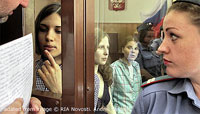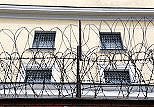Most Russians Against Prison Sentence For Pussy Riot — Poll
Interfax - 7.30.12 - JRL 2012-138
MOSCOW. July 30 (Interfax) - Most Russians (79%) are more or less aware of the punk prayer performed by the Pussy Riot band at Christ the Savior Cathedral in February 2012, and more than a third of them believe that the band members broke the moral rules, sociologists from the Levada Center told Interfax.

file photo

file photo
Almost half of respondents (53%) believe that citizens have the right to public protest against the Russian Orthodox Church's position on major social issues and criticize it but not in churches, according to the findings of a poll conducted among 1,600 people on July 20-23.
More than a third of respondents (38%) said that by staging the anti-Putin performance at Christ the Savior Cathedral, the Pussy Riot members rather violated the public moral rules than insulted the president (9%).
Most respondents said that the protest was aimed against the church and believers (19%), against the church's involvement in politics (17%), and 15% think President Putin was the main target. Sixteen percent of respondents agreed with all three assertions.
Meanwhile, almost half of the respondents (43%) consider a penalty of two to seven years of imprisonment to be disproportionate, and the number of such people has risen by 11% over the past four months (against 32% in April). As an alternative, respondents suggested compulsory work (24%), a fine (16%) or an arrest for less than two years (8%). Four percent suggested not punishing them at all.
As regards the petition signed by more than a hundred people from the culture and arts industry in defense of the arrested punk band members, the respondents' answers varied: 24% support it, 26% do not. The rest could not say anything about it.
Opinions also diverged on what the church should do in the situation around Pussy Riot: the majority (32%) believes that it must not pressure the court, while 24% on the contrary expect the Russian Orthodox Church to demonstrate Christian mercy. Yet another 17% understand the church's indignation and demand for the young women to be harshly punished.
On February 21, 2012, several Pussy Riot girls wearing masks appeared in Christ the Savior Cathedral in Moscow. They climbed up the pulpit and staged a punk concert. The action triggered a huge outcry.
A criminal case on hooliganism charges was opened. The girls were detained.
Rights defenders hold that the maximum the girls deserve for their minor hooliganism is administrative punishment. Amnesty International declared the Pussy Riot detainees prisoners of conscience.
Earlier, all three girls were remanded in custody until January 12, 2013, during a closed-door hearing at Moscow's Khamovnichesky Court.
The next hearing is due on July 30.
Keywords: Russia, Protests, Politics - Russia, Law - Russia, Religion - Russian News - Russia - Johnson's Russia List
MOSCOW. July 30 (Interfax) - Most Russians (79%) are more or less aware of the punk prayer performed by the Pussy Riot band at Christ the Savior Cathedral in February 2012, and more than a third of them believe that the band members broke the moral rules, sociologists from the Levada Center told Interfax.

file photo

file photo
Almost half of respondents (53%) believe that citizens have the right to public protest against the Russian Orthodox Church's position on major social issues and criticize it but not in churches, according to the findings of a poll conducted among 1,600 people on July 20-23.
More than a third of respondents (38%) said that by staging the anti-Putin performance at Christ the Savior Cathedral, the Pussy Riot members rather violated the public moral rules than insulted the president (9%).
Most respondents said that the protest was aimed against the church and believers (19%), against the church's involvement in politics (17%), and 15% think President Putin was the main target. Sixteen percent of respondents agreed with all three assertions.
Meanwhile, almost half of the respondents (43%) consider a penalty of two to seven years of imprisonment to be disproportionate, and the number of such people has risen by 11% over the past four months (against 32% in April). As an alternative, respondents suggested compulsory work (24%), a fine (16%) or an arrest for less than two years (8%). Four percent suggested not punishing them at all.
As regards the petition signed by more than a hundred people from the culture and arts industry in defense of the arrested punk band members, the respondents' answers varied: 24% support it, 26% do not. The rest could not say anything about it.
Opinions also diverged on what the church should do in the situation around Pussy Riot: the majority (32%) believes that it must not pressure the court, while 24% on the contrary expect the Russian Orthodox Church to demonstrate Christian mercy. Yet another 17% understand the church's indignation and demand for the young women to be harshly punished.
On February 21, 2012, several Pussy Riot girls wearing masks appeared in Christ the Savior Cathedral in Moscow. They climbed up the pulpit and staged a punk concert. The action triggered a huge outcry.
A criminal case on hooliganism charges was opened. The girls were detained.
Rights defenders hold that the maximum the girls deserve for their minor hooliganism is administrative punishment. Amnesty International declared the Pussy Riot detainees prisoners of conscience.
Earlier, all three girls were remanded in custody until January 12, 2013, during a closed-door hearing at Moscow's Khamovnichesky Court.
The next hearing is due on July 30.